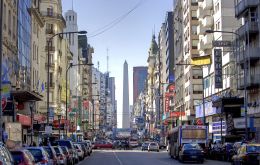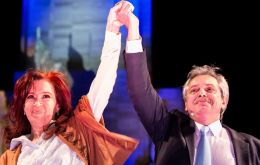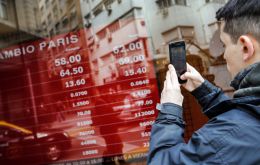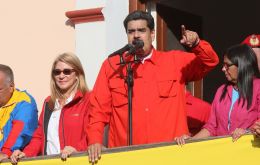MercoPress. South Atlantic News Agency
Tag: elections
-
Thursday, November 21st 2019 - 09:12 UTC
OAS demands an end to violence and an urgent call for elections

The Permanent Council of the Organization of American States, OAS, has called on Bolivian authorities to urgently call elections, an immediate cease of violence, and the search for dialogue.
-
Friday, October 25th 2019 - 04:00 UTC
Uruguay’s wealth management specialist booming under Argentine financial issues

Argentina has been facing significant financial issues in the last decade, and Uruguay wealth management teams are poised to take advantage.
-
Tuesday, October 8th 2019 - 09:56 UTC
Uruguayan election: “a ponies race, no thoroughbreds competing”

On Sunday 27 October the Uruguayan electorate will be voting for a new president (there is no immediate reelection) and a renewed Legislative, 30 Senators and 99 Lower House members. Uruguay is one of the more stable countries in the region, both it's solid institutions as well as its citizens who are deeply committed to democracy, social rights and a strong presence of government in the economy.
-
Wednesday, September 11th 2019 - 09:57 UTC
The balancing act of Alberto Fernandez between populism and free market reforms

Argentina's presidential front-runner Alberto Fernandez is on a tightrope between the interventionist policies of his better-known running mate Cristina Fernandez de Kirchner and the stumbling free-market reforms of incumbent Mauricio Macri.
-
Tuesday, September 3rd 2019 - 09:54 UTC
Argentine bonds fall to record lows; long queues to withdraw dollar funds

Argentine bond prices fell to record lows on Monday and the official and black-market pesos diverged after the country imposed capital controls in a bid to stem a currency rout that is sharpening the risk of default.
-
Friday, June 21st 2019 - 09:28 UTC
Total vote recount ordered in Guatemala's Sunday presidential election

Guatemala will hold a total vote recount after fraud allegations in the wake of last Sunday's presidential and legislative elections, the country's Supreme Electoral Court announced on Thursday.
-
Wednesday, May 29th 2019 - 09:56 UTC
Argentina: In the midst of presidential election activists re launch efforts to legalize abortion

Activists and lawmakers in Argentina relaunched a bid to legalize abortion on Tuesday with a new bill before Congress and a major demonstration planned, resuming a battle that has divided the homeland of Pope Francis ahead of October's general election.
-
Wednesday, March 27th 2019 - 08:48 UTC
Argentine financial markets jittery over October elections uncertainty

Investors in Argentina are starting to get the jitters. The gap in yield between local and U.S.-issued bonds has roughly doubled in the last month in the face of stubborn inflation and mounting peso outflows, heaping pressure on President Mauricio Macri ahead of elections later in the year.
-
Tuesday, March 12th 2019 - 09:24 UTC
Spanish election poll forecasts a hung parliament

Spain’s ruling Socialists would win 134 seats in the upcoming election due April 28, though would fall short of a majority in the 350-seat parliament forcing it to seek allies to pass legislation, a poll showed on Monday.
-
Wednesday, February 20th 2019 - 16:15 UTC
Maduro challenges Guaido to call elections

The head of Venezuela's ruling regime, Nicolás Maduro, asked the head of the National Assembly (AN), Juan Guaidó, recognized as interim president of the same nation by some 50 countries, to call presidential elections on Tuesday. Maduro's challenge is given because he believes he would defeat him and this would put an end to the dispute over the executive power that has marked an institutional crisis unprecedented in the Caribbean country.
